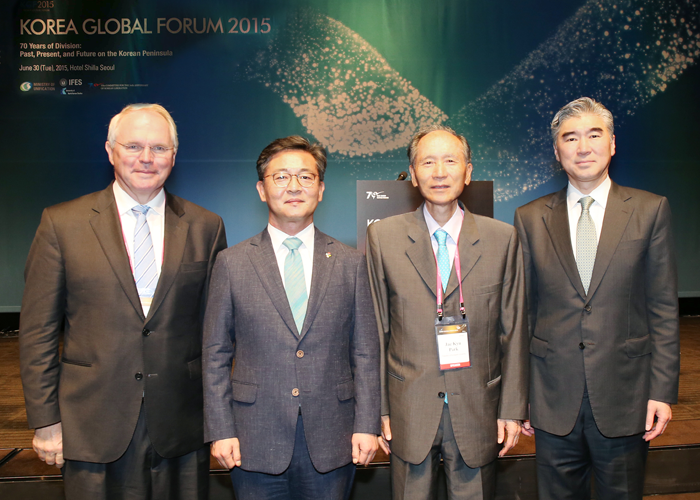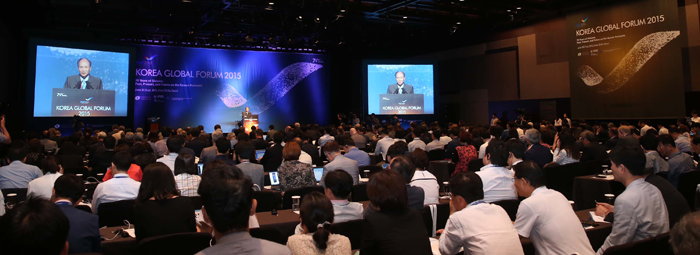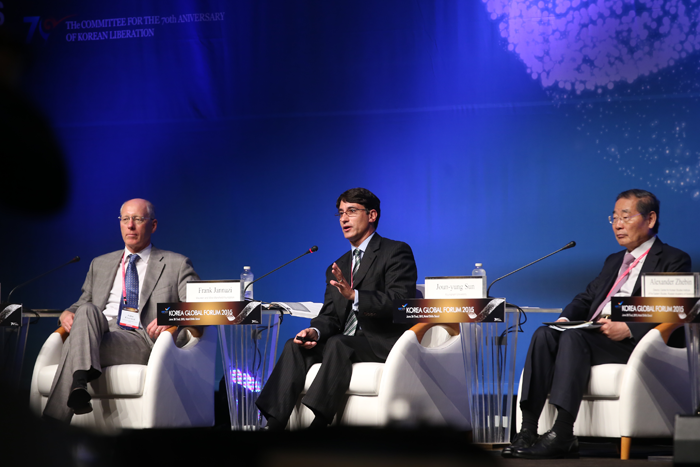IFES organizes Ministry of Unification’s annual prominent conference series
Anniversaries are times of remembrance. For Korea, 2015 marks seventy years since the nation’s liberation, and its tragic division. For Koreans and the international community, it is a time to reflect on this reality. The division of the Korean Peninsula--a legacy of the Cold War--is one of the most significant post-war political decisions of the major powers in the twentieth century. Indeed, the division has endured to influence political relationships and security arrangements among actors in East Asia, and shape the global international order.

This year’s anniversary also serves as a time for contemplation. Specifically, what lessons from the past should most inform our understanding of the present and plans for the future here on the peninsula and in the region? What can be done in the century ahead to promote a future for Korea based on reconciliation and concord rather than partition and conflict? How can we refocus to overcome the division in the post-Cold War globalization and achieve a peaceful reunification of Korea that can contribute to world peace, as well as the peace, stability, and prosperity in East Asia?
These were some of the thoughts that informed the organizers of this year’s Korea Global Forum (KGF) held this past June 29 ~ July 1, 2015 in Seoul and sponsored annually by the Ministry of Unification of the Republic of Korea.
Since 2010, the ROK Ministry of Unification has been inviting government officials and private sector experts from relevant countries to participate in its premier track 1.5 international multilateral consultative body known as the “Korea Global Forum.” The purpose of the forum is to build international consensus for peace and reunification on the Korean Peninsula.
This year, Kyungnam University’s Institute for Far Eastern Studies (IFES) was specially selected by the ministry as the organizer of the forum.

Founded in Seoul in 1972 as a research arm of Kyungnam University, IFES is a research-oriented think-tank dedicated to promoting peace and unification of Korea through scholarly contributions. Its work focuses prominently on affairs relevant to the Korean peninsula and Northeast Asia. Spearheading discourse broadly in the aforementioned areas to foster peace in the region and the world, the institute boasts longstanding productive relationships and enjoys strong academic partnerships with other renowned global institutions and organizations such as the Woodrow Wilson International Center for Scholars (USA), Chinese Academy of Social Sciences (China), the Friedrich Naumann Foundation for Liberty (Germany), Far Eastern Federal University (Russia), and Waseda University (Japan), among others. Its academic research and other educational works are conducted in close cooperation with the University of North Korean Studies (UNKS)--a groundbreaking postgraduate educational establishment in its own right, located right next door to the institute.

Under the theme 70 Years of Division: Past, Present and Future on the Korean Peninsula, this year’s Korea Global Forum in Seoul brought together active and former government officials and prominent academics from around the globe to reflect on what the division of Korea has meant to Korea as a nation and to the world as a whole, and contemplate the future of the peninsula in the context of the changing regional dynamics of East Asia and the ongoing initiatives of the Korean government toward enhancing regional peace and prosperity, including the government’s vision of a unified Korea and efforts toward laying a foundation for unification through its Trustpolitik--a diplomatic strategy comprising policy measures that frame and inform the government’s Trust Building Process on the Korean Peninsula, Northeast Asia Peace and Cooperation Initiative, and Eurasia Initiative.
Apart from the inaugural showcase event held in Seoul this past June-July, this year’s organizers plan to hold a series of conferences under the banner of the KGF. Precisely, two more conferences are scheduled to take place, both overseas: one in the de facto European Union capital, Brussels, Belgium, in October; the other in the political heart of America, Washington D.C., in November.
Similar to previous forums held, participants at the latest event in Seoul engaged in candid open- and close-door discussions over a period of two days. The cogent analysis made in and salient insights gained through these dialogue formats will no doubt assist experts and officials in the building of consensus on viable, cooperative approaches which can work to foster peace and prosperity on the Korean peninsula and the region.
By Dean J. Ouellette

